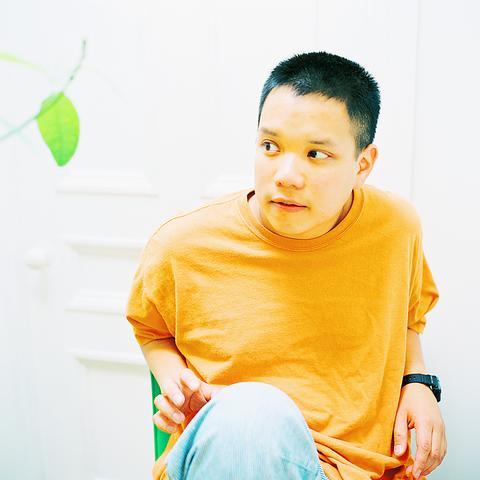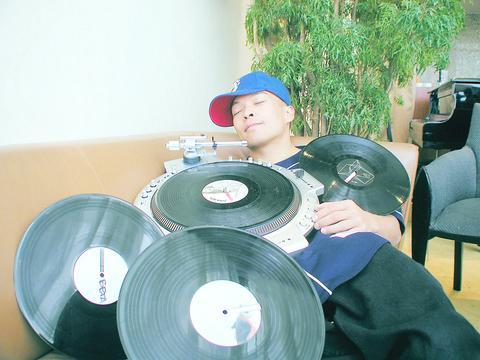The Vinyl Word popped over to Ministry of Sound last Friday to see the DMC DJ champions Enferno and Klever in action and was impressed, but not overly so. First of all, the raging typhoon outside kept the crowds to a bare minimum, which seemed a shame given these DJs' talent and the freaky deeky old-school gems they kept pulling out of their record bags.
But anyway, it was an impressive scratching display that seemed to not even register with the few people on the dance floor. Oh well. It was still nice to hear some Gloria Gaynor mixed in with Prince, Rob Base, Tribe Called Quest and other classics -- just something, anything other than another night of post-2000 hip-hop hits.
And tonight, the hip hop only gets better when Luxy hosts QBert and Room 18 has Kid Koala. Now, maybe here it's worth asking: "How did these two get billed for the same night at different clubs?" They're the top turntablists in the world and we're going to be forced to choose between them!

PHOTO COURTESY OF ROOM 18
To that end, The Vinyl Word caught up with both of them hoping for a hint of whose show to go see.
Vinyl Word: What do you like about being a DJ, or turntablist, as people say?
Kid Koala: I enjoy playing with all the aspects of it. There's room for expression every step of the way -- from selection of bits of vinyl, to layering and arranging, to performing. That's sort of the beauty of it for me. It's quite a chameleon of an instrument.

PHOTO: MAX WOODWORTH, TAIPEI TIMES
VW: At what point did you achieve the skill level where scratching didn't sound like an annoying scratch sound, but sounded like actual music?
KK: I don't know. You kind of learn to see the lineage between all the styles. I actually love making weird and annoying sounds on turntables. Sometimes that's exactly what a track calls for.
VW: Why "Kid Koala"?
KK: My friends called me that as a joke in high school when I started cutting up records. I used to drink this sugary soda thing called Koala Springs.
VW: What are the tricks that DJs are doing now that you could take credit for inventing?
KK: I would be very hesitant to take credit for anything. It's all a mix of your life experience and the crate of records that happen to be in the vicinity. You could give the same box of records to 10 DJs and get 10 very different mixed tapes.
VW: What have been some of your lucky record finds lately?
KK: I have a record that teaches you how to drink wine. I also have a record that teaches you how to go on a date. That one is very useful.
VW: What have been some memorable shows to date?
KK: Doing the tour with Radiohead was amazing. Their audience is incredibly open-eared. And the band and the crew were really cool. It was an awesome experience for me.
VW: Any musical advice or tips?
KK: Listen to something under 90 bpm in the shower so you don't feel compelled to start dancing. I don't recommend driving to my albums.
VW: What can we expect at your show here in Taipei?
KK: If the Muppets all bought DJ set-ups and decided to record an episode all on turntables it might sound a little something like this.
VW: Your friend QBert will be playing at Luxy in Taipei tonight. How are people supposed to decide who to go see?
KK: We're actually doing some gigs together in Japan the following week. So if you can't decide, you can buy a ticket to Tokyo!
As for QBert, he hauled from the US the fully functional prototype of the QFO, an integrated turntable and mixer designed by QBert and being made by Vestax. The QFO also features an audio input that allows him to use one deck for his entire show.
Vinyl Word: To what degree is the turntable an instrument?
QBert: Right now turntablism is very percussive. But with the pitch control, we can start to make a lot of melodies.
VW: How are you taking turntablism into new areas?
QBert: Actually, I love it that it's percussive. But you can get more melodic with the pitch control. And even with your hand by moving the record you can make it so it's like a fretless bass. It's technical, but it's even beyond technical. It's spiritual when you get the feeling for it.
VW: Are there any limitations to what a turntable and record can do musically?
QBert: The only limitations are your beliefs. If you believe you can make a sound, you can make that sound.
VW: You've designed the QFO when lots of DJs are switching to CDs. Do you use CDs?
QBert: Not really. I'm more of an analog person. It's like asking a pianist who plays on a grand piano if he likes to play on an electric keyboard.
VW: Does that make you a vinyl purist?
QBert: Yeah, I guess it does.
VW: Your style is hip hop, but what do you listen to at home?
QBert: Only jazz, straight up. And some guitarists, like Stevie Ray Vaughn. I'm really into music theory. But my roots are hip hop.
VW: Would you say you're trying to take the complexity of jazz percussion and bring it to hip hop?
QBert: Well, no one is making hip hop in strange time signatures, but it could be done. It's just really difficult.
VW: What have you heard lately that's blown your mind?
QBert: I get mixed tapes all the time and sometimes there'll be some reverse shit, combined with some reverse chirps, and maybe a boomerang or something and we'll all be like: `Wow, he took it to another level there.' There's lots of great stuff, but the scratch scene is very undergound.
VW: Kid Koala's going to be in town tonight as well. How are we to choose?
QBert: He's here? Aw man, I wouldn't even know.
Performance notes:
Kid Koala is tonight at Room 18, located at B1, 18 Songshou Rd, Taipei (
Tickets cost NT$800, students NT$600.
QBert is tonight at Luxy, located at 5F, 201 Zhongxiao E Rd, Sec 4, Taipei (
Tickets costs NT$500 before 11pm, NT$900 thereafter. Also tonight at Luxy is DJ Victor's CD release party in the Lotus Room backed up by Joe Ho.

William Liu (劉家君) moved to Kaohsiung from Nantou to live with his boyfriend Reg Hong (洪嘉佑). “In Nantou, people do not support gay rights at all and never even talk about it. Living here made me optimistic and made me realize how much I can express myself,” Liu tells the Taipei Times. Hong and his friend Cony Hsieh (謝昀希) are both active in several LGBT groups and organizations in Kaohsiung. They were among the people behind the city’s 16th Pride event in November last year, which gathered over 35,000 people. Along with others, they clearly see Kaohsiung as the nexus of LGBT rights.

Dissident artist Ai Weiwei’s (艾未未) famous return to the People’s Republic of China (PRC) has been overshadowed by the astonishing news of the latest arrests of senior military figures for “corruption,” but it is an interesting piece of news in its own right, though more for what Ai does not understand than for what he does. Ai simply lacks the reflective understanding that the loneliness and isolation he imagines are “European” are simply the joys of life as an expat. That goes both ways: “I love Taiwan!” say many still wet-behind-the-ears expats here, not realizing what they love is being an

In the American west, “it is said, water flows upwards towards money,” wrote Marc Reisner in one of the most compelling books on public policy ever written, Cadillac Desert. As Americans failed to overcome the West’s water scarcity with hard work and private capital, the Federal government came to the rescue. As Reisner describes: “the American West quietly became the first and most durable example of the modern welfare state.” In Taiwan, the money toward which water flows upwards is the high tech industry, particularly the chip powerhouse Taiwan Semiconductor Manufacturing Co (TSMC, 台積電). Typically articles on TSMC’s water demand

Every now and then, even hardcore hikers like to sleep in, leave the heavy gear at home and just enjoy a relaxed half-day stroll in the mountains: no cold, no steep uphills, no pressure to walk a certain distance in a day. In the winter, the mild climate and lower elevations of the forests in Taiwan’s far south offer a number of easy escapes like this. A prime example is the river above Mudan Reservoir (牡丹水庫): with shallow water, gentle current, abundant wildlife and a complete lack of tourists, this walk is accessible to nearly everyone but still feels quite remote.